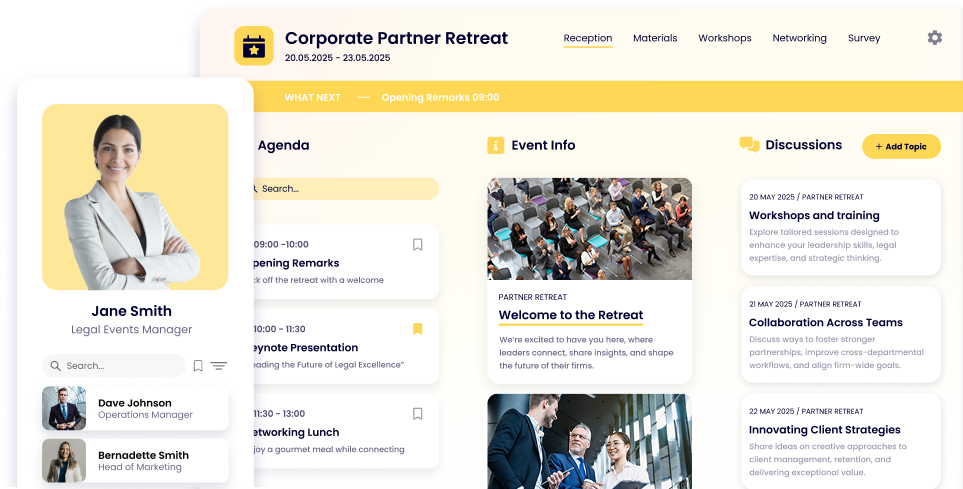Event Technology: Trends to Be Followed In 2024

Lisa Broom | Head of Marketing

No matter what kind of event you are hosting, chances are you want to get it right. You want to make a big impression, make sure everyone has a good time, and maybe even more forward some key performance indicators! As with everything else in 2024, there are a lot of technological solutions.
Embracing the latest event technology not only enhances attendee experiences but also streamlines event management, making it more efficient and impactful. Let’s dive into the essential event technology trends for 2024 and how they can transform your events.
Key Takeaways
- Rise of Artificial Intelligence (AI): AI-driven solutions for better event management and attendee engagement.
- Smarter Networking and Lead Capture: Enhanced tools for meaningful connections.
- Mobile Apps: Improving attendee experience with seamless integration.
- Immersive AR/VR Experiences: Bridging the physical and virtual worlds.
- Sustainability: Leveraging technology for eco-friendly events.
- Strengthened Security Measures: Enhanced data protection and security protocols.
What Is Event Technology?
Event technology encompasses a wide range of tools and platforms designed to enhance various aspects of event planning and execution. From registration and marketing to networking and analytics, event tech software and hardware streamline operations and boost attendee engagement.
Today, many solutions are full event tech platforms, offering an all-in-one approach. Still others may serve a single function, but they are fully optimized for that limited use.
Examples of Event Technology

Integrating the right event technology tools can significantly enhance the success of your events. By leveraging innovative solutions, you can streamline planning, improve attendee engagement, and gather valuable data.
Enhancing connections among attendees is crucial for a successful event. Fliplet’s event networking app is designed to facilitate meaningful interactions by providing features like real-time chat, personalized attendee profiles, and interactive forums. This app ensures that participants can easily connect, share insights, and build lasting professional relationships.
Effective promotion is key to attracting attendees and creating buzz around your event. Fliplet offers powerful event marketing tools, including a marketing app and a branded app. The marketing app helps you design and execute targeted campaigns, manage registrations, and track engagement metrics. Meanwhile, the branded app allows you to create a customized event experience that reflects your brand’s identity, enhancing brand recognition and loyalty. (This can all be folded into a single event app in Fliplet!)
Creativity and collaboration are also essential for planning engaging events. Fliplet’s brainstorming app fosters idea generation by providing a platform where team members can collaborate in real-time. This tool supports features such as idea voting, categorization, and visual brainstorming sessions, making it easier to develop innovative concepts and solutions for your event.
Access to real-time insights is vital for making informed decisions during an event. Fliplet’s mobile reporting app offers comprehensive reporting capabilities, allowing you to monitor key metrics such as attendee engagement, session popularity, and feedback in real time. This immediate access to data enables you to make quick adjustments to improve the event experience.
Capturing and analyzing data is crucial for evaluating the success of your event and planning future improvements. Fliplet’s data capture tool is designed to gather detailed information on attendee behavior, feedback, and overall event performance. This tool provides robust analytics that help you understand what worked well and what needs enhancement, ensuring continuous improvement in your event planning process.
By integrating these advanced event technology tools, you can enhance every aspect of your event, from planning and promotion to execution and analysis. These solutions not only streamline operations but also create a more engaging and impactful experience for your attendees.
All of the above functionalities can be easily combined into a single Fliplet event app. That’s because Fliplet gives you the ability to make fully customized apps without using a single line of code. So no matter how complex or simple your event app needs to be, you can make the perfect fit with Fliplet.
Why Is Event Technology Important?
Event tech is vital because it enhances efficiency, improves attendee experiences, and provides valuable insights through data analytics. By leveraging the right tools, event planners can ensure smooth operations and maximize the impact of their events.
And, let’s face it, your event tech also adds to the allure. It offers people a chance to try out new things, and that alone can get people through the door with curiosity.
How To Choose the Right Event Tech

Selecting the right event technology solutions can significantly enhance the efficiency and success of your event. While it helps to know the event tech trends in the first place, you need to follow some steps to make sure they work for your particular situation.
Align Your Event Goals
The first step in choosing the right event technology is to clearly identify your event’s objectives. Whether your goal is to increase attendee engagement, streamline operations, or gather insightful data, your chosen technology should directly support these goals. For example, if your objective is to enhance networking, tools like Fliplet’s event networking app would be ideal.
Remember, even though something might be a popular option, event management tools should match your needs first and foremost. That’s especially true for expense and complexity. If you only need a few key functions, there’s no point investing in a highly expensive option that’s hard to master simply because it’s the most common choice.
Pick the Suitable Event Format for You
In-Person Events
Just because it happens in the low-tech realm of the real world, live event technology is extremely important — and the field has rapidly advanced in the last two years as in-person events have returned.
For in-person events, focus on technology that enhances face-to-face interactions and streamlines logistics. This could include registration software, mobile apps for real-time updates, and networking tools that facilitate connections among attendees. Look for solutions that offer features such as check-in management, interactive maps, and attendee tracking to ensure a smooth and engaging experience.
Key Features:
- Check-in management
- Interactive maps
- Attendee tracking
- Real-time updates
Virtual Events
When planning virtual events, opt for platforms that provide robust online event management tools. These should include capabilities for live streaming, virtual networking, and interactive sessions.
Ensure your virtual event tech supports high-quality video and audio, easy navigation, and interactive features like Q&A, polls, and chat to keep attendees engaged throughout the event.
Key Features:
- Live streaming
- Virtual networking
- Interactive sessions (Q&A, polls, chat)
- High-quality video and audio
Hybrid Events
Hybrid events require technology that effectively integrates both in-person and virtual elements. Look for solutions that offer seamless synchronization between live and virtual components, enabling attendees to participate fully regardless of their location.
Features such as live streaming of physical sessions, virtual breakout rooms, and hybrid networking tools are essential to bridge the gap between physical and digital experiences.
Key Features:
- Live streaming of physical sessions
- Virtual breakout rooms
- Hybrid networking tools
- Seamless synchronization
Key Factors When Choosing Event Technology

Choosing the right event technology is akin to selecting the perfect venue for your event. According to insights from the Quora community, key factors that event managers consider when choosing a venue include location, capacity, amenities, and cost. But in 2024, that increasingly means capacity for advanced event technology.
While we used to just need to worry about the amount of parking and access to a coffee maker, there are now a lot more options.
Similarly, when selecting event technology, several critical factors come into play to ensure a seamless and impactful event.
-
Hybrid Compatibility
In today’s event landscape, it’s crucial to choose technology that can seamlessly integrate both in-person and virtual elements. This ensures that all attendees, whether they are present physically or virtually, have a cohesive and engaging experience. Look for platforms that offer robust support for live streaming, virtual breakout rooms, and interactive features that bridge the gap between physical and digital attendance. This versatility not only enhances the attendee experience but also expands your event’s reach and inclusivity.
-
User-Friendliness
User-friendliness is a top priority when selecting event technology. Choose tools that are intuitive and easy to navigate for both event planners and attendees. An intuitive interface reduces the learning curve, allowing users to focus on the event rather than struggling with the technology. Features such as drag-and-drop functionality, clear navigation menus, and straightforward user guides can significantly enhance the overall experience, making it accessible to users of all technical levels.
-
Reliability
Opting for reliable technology is essential to avoid technical glitches that can disrupt your event. Proven solutions with a strong track record of performance ensure that your event runs smoothly from start to finish. Reliability encompasses not only the stability of the platform but also its ability to handle high traffic volumes, deliver consistent performance, and offer robust backup options in case of any issues.
-
Top Customer Support Availability
Having access to top-notch customer support is crucial for resolving any issues that may arise quickly and efficiently. Look for providers that offer comprehensive support options, including 24/7 availability, multiple contact channels (such as phone, email, and live chat), and a dedicated support team. Good customer support can make a significant difference in managing unexpected challenges and ensuring a seamless event experience for both organizers and attendees.
-
Easy Accessibility
Ensuring that the technology is easily accessible to all attendees, regardless of their technical expertise, is vital for maximizing participation. Choose platforms that offer features such as mobile compatibility, multilingual support, and accessibility options for individuals with disabilities. Easy accessibility helps in creating an inclusive environment where all attendees can fully engage and participate in the event, enhancing the overall success and impact of your event.
-
Security
With digital tools, security is always an ongoing concern. Attendees should be able to trust that the information they give you is safe. Security breaches are devastating for a brand’s connection to its team members, customers, and partners. Want to know more about keeping apps secure? Check out Fliplet’s security here.
How To Find the Best Event Tech
Finding the best event technology for your needs can be a daunting task, given the plethora of options available. To make an informed decision, it’s essential to explore event technology review sites where you can read unbiased feedback from users who have firsthand experience with various tools.
-
Explore Review Sites
Event technology review sites like G2, Capterra, and Trustpilot offer comprehensive insights into different event tech solutions. These platforms provide ratings, user reviews, and detailed comparisons that can help you identify the strengths and weaknesses of each tool.
-
Look for High Ratings and Detailed Reviews
When browsing these review sites, pay close attention to platforms where Fliplet is highly rated. For instance, Fliplet is well-regarded on G2 for its comprehensive solutions that cater to various aspects of event management, from networking and marketing to data capture and reporting.
-
Consider User Feedback
User feedback is invaluable in understanding the real-world application of the technology. Look for reviews that discuss the ease of use, customer support, and specific features that are most relevant to your needs. This can provide you with a clearer picture of how the technology performs in different scenarios.
-
Compare Features and Pricing
Use the comparison tools available on these review sites to evaluate the features and pricing of different event tech solutions. This can help you determine which tools offer the best value for your budget and requirements.
Fliplet: Best Event Technology Tool for 2024
In the rapidly evolving event technology landscape, Fliplet stands out as the top event management platform for 2024. Offering comprehensive customization with its no-code platform, Fliplet allows event organizers to create fully tailored apps to meet specific needs, ensuring a seamless and engaging experience for attendees.
Advanced Event Management
Fliplet excels in event management with tools that streamline operations and enhance attendee experiences. Its robust event app includes features like real-time updates, personalized schedules, and interactive elements such as polls and Q&A sessions, making it indispensable for any event type.
AI-Driven Solutions
Artificial Intelligence is a game-changer for event technology, and Fliplet leverages AI to provide personalized experiences and smarter data analytics. AI-powered tools in Fliplet help with automating tasks like scheduling, registration, and follow-ups, while also offering deep insights through real-time data analysis, ensuring your event runs smoothly and meets its objectives.
Superior Networking Tools
Networking is crucial for event success, and Fliplet’s event app includes real-time chat, personalized attendee profiles, and interactive forums. These features facilitate meaningful connections and ensure participants can easily connect, share insights, and build lasting professional relationships.
Immersive and Sustainable Technology
Fliplet incorporates cutting-edge AR/VR technologies to create immersive environments that bridge physical and virtual experiences, enhancing attendee engagement. Additionally, Fliplet supports sustainable practices with digital tickets, programs, and other eco-friendly solutions.
Enhanced Security and Support
Security is a priority, with Fliplet ensuring robust protection of attendee data and secure transactions. The platform also offers 24/7 customer support through various channels, ensuring any issues are promptly resolved.
Event Technology Trends for 2024

Staying ahead of the curve is essential in the fast-paced world of event technology. Here are the key event management technology trends for 2024 that you need to know.
Rise of Artificial Intelligence (AI)
Artificial Intelligence is set to revolutionize how we plan and execute events by offering personalized experiences and smarter data analytics. Here’s how AI will impact event technology:
- Personalization: AI can analyze attendee data to tailor experiences.
- Automation: Streamlining tasks like scheduling, registration, and follow-ups.
- Analytics: Providing deep insights through real-time data analysis.
Smarter Networking and Lead Capture
Networking is a critical component of any event, and advanced tools are making it more effective. Smarter networking and lead capture technologies will include:
- Enhanced Matchmaking: Algorithms to connect attendees with similar interests.
- Lead Scoring: AI-driven scoring to identify high-potential leads.
- Real-Time Engagement: Tools for instant connection and follow-up.
Improving the Attendee Experience with a Mobile App
Mobile apps are becoming indispensable for enhancing attendee experiences. These apps provide:
- Real-Time Updates: Instant notifications and schedule changes.
- Personalized Schedules: Tailored agendas based on attendee preferences.
- Interactive Features: Engagement through polls, Q&A sessions, and networking tools.
Offering Immersive AR/VR Experiences
Augmented Reality (AR) and Virtual Reality (VR) are creating immersive environments that bridge physical and virtual experiences. Key benefits include:
- Virtual Tours: Interactive virtual tours of event spaces.
- Immersive Presentations: Engaging AR/VR presentations and demos.
- Enhanced Networking: Virtual networking lounges and breakout rooms.
Bridging Physical and Virtual Realms
Hybrid event technology is crucial for integrating in-person and virtual elements seamlessly. This integration will involve:
- Unified Platforms: Tools that cater to both physical and virtual attendees.
- Interactive Content: Engaging both in-person and remote participants.
- Synchronized Experiences: Ensuring consistent engagement across both realms.
Sustainability Through Technology
Sustainability is becoming increasingly important in event planning. Technology can help reduce the environmental impact through:
- Digital Solutions: Minimizing paper use with digital tickets and programs.
- Energy Efficiency: Utilizing energy-efficient technologies.
- Waste Reduction: Tools for managing and reducing event waste.
Strengthened Security Measures
With the rise of digital events, security is paramount. Enhanced security measures will focus on:
- Data Protection: Ensuring attendee data is secure and compliant with regulations.
- Secure Transactions: Safe handling of payments and transactions.
- Access Control: Robust access control systems to protect sensitive areas and information.
Learn More About Event Technologies with Fliplet
Looking to take advantage of these event tech trends? Then it’s time you tried a platform that does everything you need in a fully customized app.
In other words, it’s time to try Fliplet.
Discover how Fliplet can transform your events with innovative technology solutions. Book a free meeting with our team to see how we can help make your next event a massive success!
FAQs
How can event technology enhance attendee engagement in 2024?
Event technology provides interactive tools and personalized experiences that keep attendees engaged and connected.
What role will virtual and hybrid event solutions play in 2024?
Virtual and hybrid solutions will be crucial in making events more accessible and flexible, accommodating diverse attendee preferences.
Are there new security measures being integrated into event technology for 2024?
Yes, enhanced security measures are being implemented to protect data and ensure compliance with the latest regulations.
How can event technology adapt to changing attendee expectations in 2024?
Event technology will offer more personalized and interactive experiences, meeting the evolving needs and preferences of attendees.
Are there new regulations or compliance requirements impacting event technology in 2024?
Yes, staying updated with new regulations is essential to ensure compliance and protect attendee data.


![30 Best Mobile Event Apps and Conference Apps [2024]](https://fliplet.com/wp-content/uploads/2023/02/15-Best-Event-Apps_Thumbnail.png)


